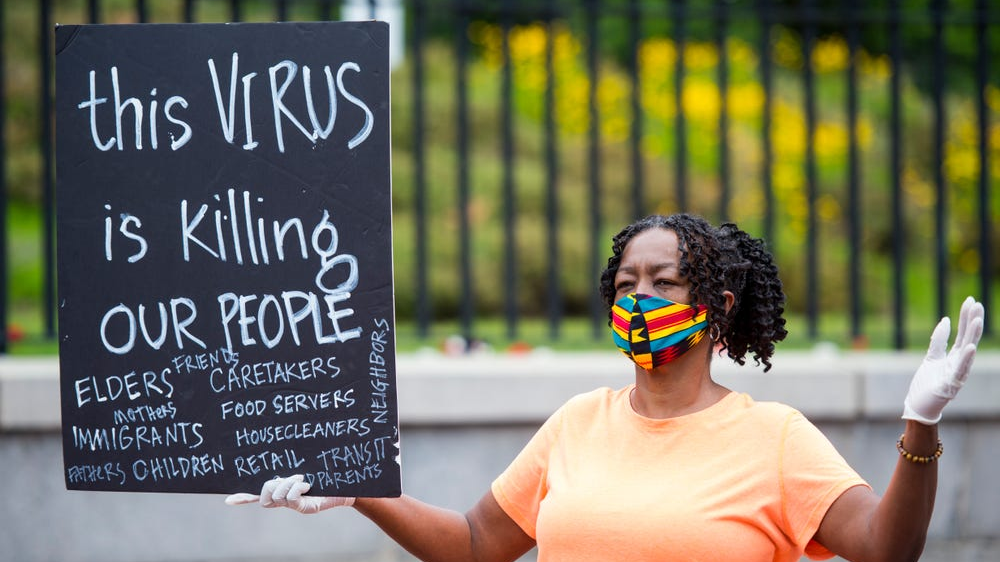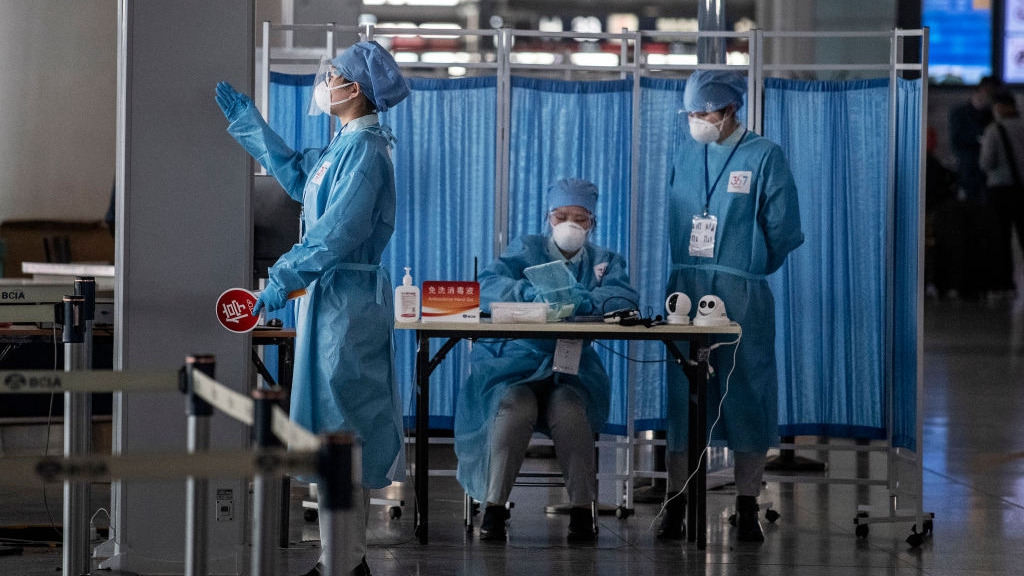
Alice Gaskins holds a sign in front of the Massachusetts State House during a funeral procession for essential workers that were sick with or died from COVID-19, U.S., May 25, 2020. /Getty
Alice Gaskins holds a sign in front of the Massachusetts State House during a funeral procession for essential workers that were sick with or died from COVID-19, U.S., May 25, 2020. /Getty
Editor's note: Keith Lamb is a University of Oxford graduate with a Master of Science in Contemporary Chinese Studies. His primary research interests are China's international relations and "socialism with Chinese characteristics." The article reflects the author's opinions and not necessarily the views of CGTN.
With the control measures implemented in Chengdu for the outbreak of COVID-19, corporate news has been abuzz with framing China's dynamic zero-COVID policy as a policy of repression.
The narrative is centered around "unnecessarily" taking away personal freedom while simultaneously "destroying" the economy. Bloomberg's economic forecast for China is that economic growth is now only projected to grow 3.5 percent in 2023 compared to the original 3.9 percent forecast. Then there is the problem of "COVID-19 fatigue," where some would like more individual liberty.
Why not then just follow the U.S. model and let everyone make their own decision? Simply put, COVID-19 might be out of the news but it's not over. Statistics from Worldometers show that 308 of the global 1,780 COVID-19 deaths, on September 2, came from the U.S., and the only country with more deaths was Japan at 318.
According to Victor Gao, a chair professor at Soochow University, Japan's hospitals are overburdened. Consequently, if Japan's advanced health system is strained, imagine how China's developing health system would cope.
If any glimmer of good news can be taken from COVID-19, it is that China's determination to expand and strengthen healthcare will only be fortified. This very sentiment was expressed by Chinese President Xi Jinping on his visit to Sichuan where he said "the health system should be strengthened in rural areas to provide a sound guarantee of basic medical services."
Now, of course, the U.S. as a sovereign nation can make its own healthcare decisions when it comes to its COVID-19 policy, and if it considers its over 1 million deaths – which has contributed to China's life expectancy surpassing the U.S. – as the price of liberty, then so be it. China, on the other hand, has strong traditions of respecting everyone's right for living. Importantly, this notion of what is good for society is projected into future plans.
Let us imagine that China, with its huge population and dense cities, followed the U.S. policy: then it's not beyond imagination that five to ten million deaths could occur. The corporate press would have a field day with what it would consider "delightful news" and no doubt redefine the term "genocide" to describe this outcome. This would lead to the CPC losing control, as citizens would see the party as not protecting society as a whole.
Beyond the human impact, such casualties would interfere with China's developmental goals. Right-wing globalists can use Darwinian logic to justify the deaths of the weak and old, but this can have unforeseen impacts that, while they may not impact profit margins now, will undermine a state's socio-economic future.
For example, the U.S. has over 200,000 children who lost one or both primary caregivers due to COVID-19. These children will have a significant disadvantage growing up, which will affect their productive power as individuals as well as for society at large. In China, where the elderly often take care of their grandchildren, their loss is the loss of an important economic actor that plays an important role in the informal economy.

Body temperature checking point at Beijing Capital International Airport in Beijing, China, March 24, 2020. /Getty
Body temperature checking point at Beijing Capital International Airport in Beijing, China, March 24, 2020. /Getty
Either way, the economy is only useful if it works to develop society as a whole. It is more than just GDP figures and profits for large globalist conglomerates. However, at the end, of the day the news that China faces economic gloom and doom due to its COVID-19 strategy isn't true.
Undoubtedly, lockdowns do contribute to economic stagnation but even if China's GDP only grows by 3.5 percent, this is still growth. To get a true "objective" picture, China's economic future can be contrasted with the U.S. to see if the U.S. COVID-19 policy is better.
Considering that Comercia is predicting a looming U.S. economic recession, based on falling employment, output, sales, and income, even China's short-term future looks relatively good. Thus, we should not be taken in that China is destroying its economy, the basis of people's livelihoods, for the sake of political dogma.
Anyway, an even more plausible explanation for any economic downturn is global decoupling at the conscious behest of the U.S., which undoubtedly the coincidence of COVID-19 and its disruptions to supply chains only fuels.
Of course, considering COVID-19 was proven to have been spreading around a cluster of U.S. army bases in Northern Italy way before it came to Wuhan and the theory that COVID-19 arose from Fort Detrick in Maryland only adds fuel to conspiracy theorists regarding the nature of COVID-19 which, if not a weapon to bring on decoupling, has been weaponized to politically attack China and continues to do so as corporate media disparage China's dynamic zero-COVID efforts to minimize deaths.
The corporate media would do better to focus on the "genocide" of one million Americans and the U.S. economy. As for their concern for Chinese citizens and its economy, I expect Chinese pragmatism will constantly be dynamically weighing the cost of its COVID-19 policy in relation to the economic costs which are defined as being in the good of the populace as a whole.
(If you want to contribute and have specific expertise, please contact us at opinions@cgtn.com. Follow @thouse_opinions on Twitter to discover the latest commentaries on CGTN Opinion Section.)

